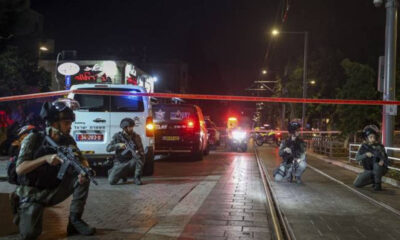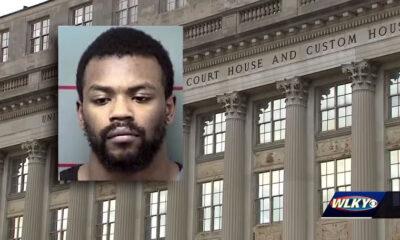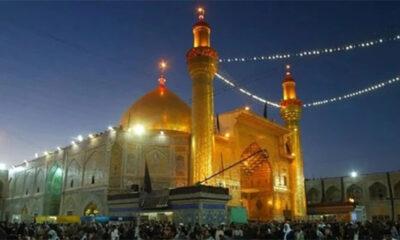International
Supreme Court gun ruling stuns Las Vegas shooting survivors
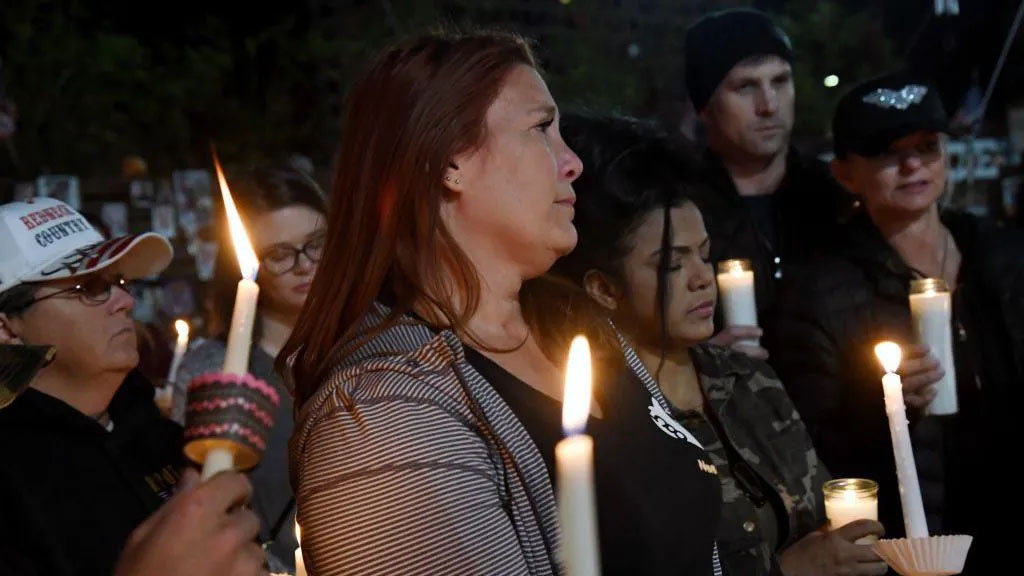
Supreme Court gun ruling stuns Las Vegas shooting survivors
On 1 October 2017, Heather Gooze was serving drinks at the Route 91 music festival in Las Vegas when concert-goers began running into her bar, screaming and covered in blood.
A gunman perched high in a Las Vegas hotel had opened fire on the festivities below. He killed 60 people and wounded over 400 more. He was able to carry out what is still the deadliest mass shooting in US history because of a mechanism he installed on his gun known as a bump stock.
In the aftermath of the massacre, then-President Donald Trump banned bump stocks, a modification that allows a rifle to fire like a machine gun. It was a rare example of the US making a change to its gun policies in the wake of a mass shooting, and it was a reform that survivors of the attack welcomed.
The ban was all the more extraordinary because it was instituted by a Republican president and supported by the National Rifle Association, figures that would normally oppose a gun control proposal.
On Friday, the US Supreme Court struck down the ban, deciding in a 6-3 opinion that the Bureau of Alcohol, Tobacco, Firearms and Explosives had overstepped its authority to outlaw the device.
For survivors like Ms Gooze, who identifies as liberal and thought Trump’s ban was “phenomenal”, the ruling felt like a step backward for the country.
“Who has ever used a bump stock for good?” she told the BBC. “There’s no reason for a civilian to use a mass shooting machine.”
Ms Gooze, 50, still vividly remembers the panic of helping people flee the carnage, and the frantic battle to save the people struck by the more than 1,000 rounds that the gunman fired with the help of his weapon’s modification.
“I had my finger in the bullet hole of one of our angels in the back of their head,” she said of one victim she tried to save. She stayed with the body of another victim for hours, using a phone she found in their pocket to contact the family.
“I watched people’s lives change right in front of my face, as well as my own,” she said.
One of those lives was Brittany Quintero’s. Ms Quintero was separated from her friend in the chaos of the shooting, and though they both survived, she has spent years working through the trauma the shooting inflicted.
READ ALSO:
- Tinubu’s June 12 fall: Humour, karma, compassion, By Farooq Kperogi
- Minimum wage: New law to sanction defaulting states coming – Senate
- FG bows to pressure, reconstitutes governing boards of 111 tertiary institutions
She told the BBC that the Supreme Court’s decision had left her reeling.
“It feels like another slap in the face, to be honest,” she said.
Ms Quintero, 41, said she does not necessarily believe that more stringent gun restrictions would help prevent mass shootings. She also believes not enough proposed solutions address mental health.
“I don’t think taking away people’s Second Amendment rights is going to solve these things that keep occurring,” she said, referring to the protections for gun owners enshrined in the US Constitution.
“If someone has it in their mind to do it, they’re going to find a way or other means.”
But despite her reservations, she still thinks the Supreme Court was wrong to reinstate access to bump stocks.
The Route 91 survivors were not universally disheartened by the Supreme Court decision. Several were discussing the news in a private Facebook group, Ms Gooze said, and some members of the community had responded that the ruling did not bother them.
“A gun isn’t the issue, we need them to keep what little freedom we have left. It’s the government that’s the enemy,” one survivor wrote in a message that Ms Gooze read to the BBC.
Gun violence remains a major public safety issue in the United States. The nation has experienced 215 mass shootings so far in 2024, according to the Gun Violence Archive (their methodology defines a mass shooting as when four or more people are shot or killed, not including the shooter).
Both Ms Gooze and Ms Quintero lamented that the gun debate had grown so politicised.
“I don’t think I’m ever going to see in my lifetime a true law or decision that will be made to solve the gun violence issue,” Ms Gooze said.
Repeated attempts to ban bump stocks through federal legislation have stalled, and face little chance of passing in the near term due to a divided Congress.
Trump, who is again running for president, said he would respect the Supreme Court’s decision to strike down his policy and reaffirmed his support for broader access to guns.
“The Court has spoken and their decision should be respected,” Trump campaign spokeswoman Karoline Leavitt said in a statement. “President Trump has been and always will be a fierce defender of Americans’ Second Amendment rights and he is proud to be endorsed by the NRA.”
In video on X, formerly Twitter, the gun shop owner who challenged the bump stock ban at the Supreme Court celebrated his victory and said he had prevented the government from banning other gun parts.
The nation’s highest court sided with his argument that the Trump administration overstepped when it sought to regulate bump stocks like machine guns.
“I stood and fought,” said gun shop owner Michael Cargill, “and because of this, the bump stock case is going to be the case that saves everything.”
Supreme Court gun ruling stuns Las Vegas shooting survivors
BBC
International
Israeli strikes pound central Beirut, suburbs
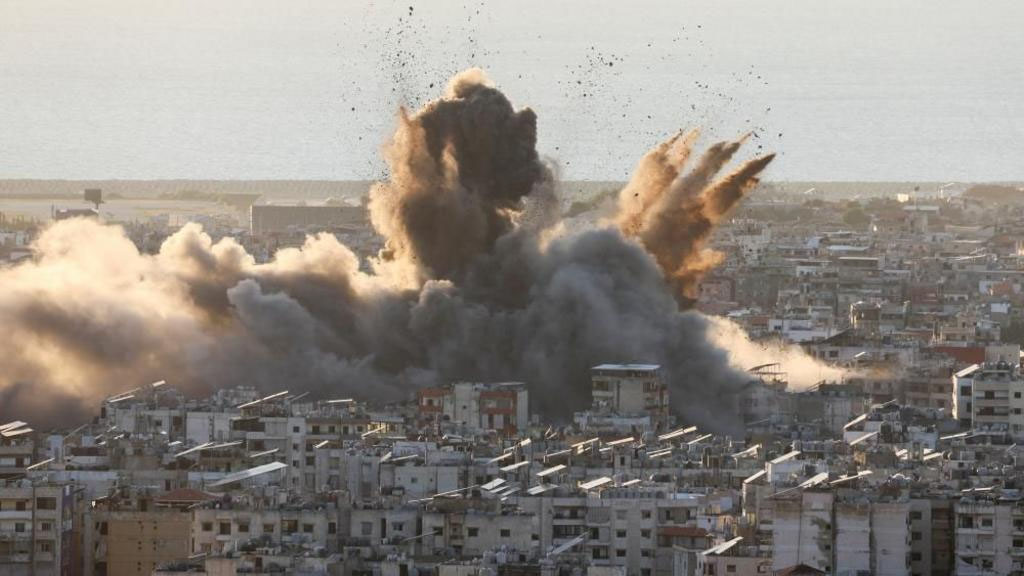
Israeli strikes pound central Beirut, suburbs
BEIRUT: Israeli strikes pounded a densely-populated part of the Lebanese capital and its southern suburbs on Tuesday, hours ahead of an anticipated announcement of a ceasefire ending hostilities between Israel and Lebanese armed group Hezbollah.
A strike on Beirut hit the Noueiri district with no evacuation warning and killed at least one person, Lebanon’s health ministry said in a preliminary toll.
READ ALSO:
- French football star, Paul Pogba’s blackmail trial begin in Paris
- French football star, Paul Pogba’s blackmail trial begin in Paris
- Vigilante arrested in Anambra for robbery
Minutes later, at least 10 Israeli strikes hit Beirut’s southern suburbs. They began approximately 30 minutes after the Israeli military issued evacuation orders for 20 locations in the area, the largest such warning yet.
As the strikes were under way, Israel’s military spokesperson Avichay Adraee said the air force was conducting a “widespread attack” on Hezbollah targets across the city.
Israeli strikes pound central Beirut, suburbs
ARAB NEWS
International
Over $100m wasted, Trump mocks Democrats for targeting him

Over $100m wasted, Trump mocks Democrats for targeting him
Former U.S. President Donald Trump has fiercely criticised the legal cases brought against him, calling them “empty and lawless”.
He accused Democrats of weaponising the judicial system to target him as a political opponent.
In a strongly worded statement, Trump alleged that over $100 million in taxpayer money had been wasted in what he described as a politically driven effort to undermine his influence.
“Nothing like this has ever happened in our Country before,” he said, pointing to high-profile prosecutors, including Georgia’s Fani Willis and New York Attorney General Letitia James, as key figures in what he called a “political hijacking.”
READ ALSO:
- PH refinery: 200 trucks will load petroleum products daily, says Presidency
- US-based Nigerians get 30-year sentence over $3.5m romance scam
- 4 Nigerians arrested in Libya for alleged drug trafficking, infection charges
Trump also accused Willis of colluding with Nathan Wade, whom he described as “her lover” and lacking the experience to handle such cases.
He claimed Wade was paid “millions,” allegedly enabling lavish trips and cruises.
Letitia James, who is pursuing a civil fraud case against Trump, was also criticised.
He claimed she had campaigned on a promise to “get Trump” in her bid for office, an action he labelled “unethical” and “probably illegal.”
Trump also mentioned Manhattan District Attorney Alvin Bragg, alleging that Bragg initially resisted prosecuting him but was pressured into action by the Justice Department and the Democratic Party.
Describing the series of legal actions as a “low point in the history of our Country,” Trump maintained his resolve, declaring: “I persevered, against all odds, and WON.”
Over $100m wasted, Trump mocks Democrats for targeting him
International
US-based Nigerians get 30-year sentence over $3.5m romance scam
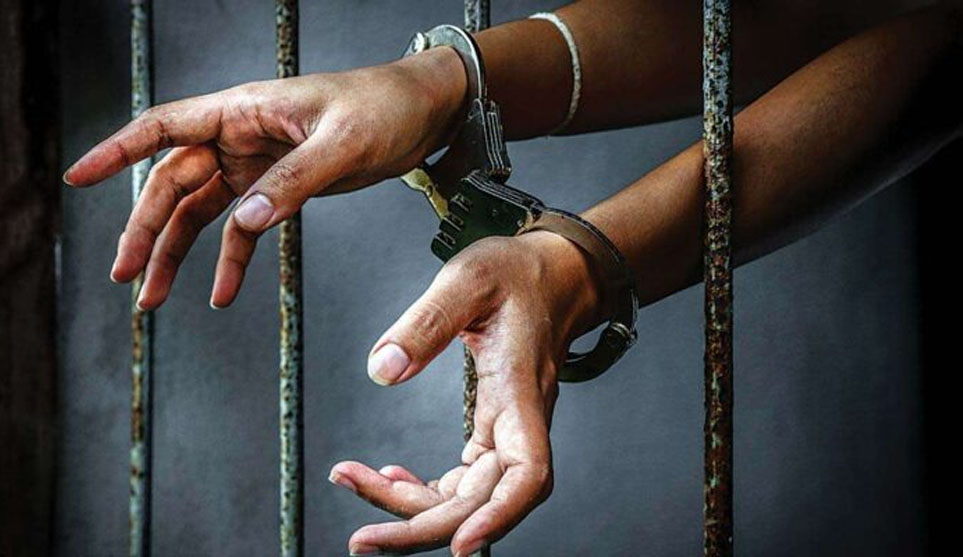
US-based Nigerians get 30-year sentence over $3.5m romance scam
A United States federal jury sentenced two Nigerians, Anthony Ibekie and Samuel Aniukwu, to 30 years in prison for scamming certain US citizens $3,500,000.
This was mentioned in a news statement made public on the US Department of Justice website on Monday.
According to the statement, the Nigerians, Ibekie and Aniukwu mislead their victims by informing them that they had received big inheritances that required payment to claim.
The couple would then ask their victims to transfer money, promising to refund them after the inheritances were claimed.
It also stated that the duo carried out romance scams by establishing romantic relationships with their victims and demanding them to send money after they had built trust in their victims.
It read, “An undercover law enforcement investigation has resulted in federal prison sentences for two Nigerian nationals residing in the Chicago suburbs who conducted online inheritance scams and other fraud schemes.
“Using aliases, Anthony Emeka Ibekie and Samuel Aniukwu communicated with victims throughout the United States, convincing them they had received substantial inheritances and needed to send money to individuals associated with the defendants in order to claim it.
“In addition to the inheritance scam, the pair carried out an online romance scam that involved communicating with victims via social media and dating websites, building trust with the victims through a purported online romance, and convincing them to send money to a predetermined recipient. Aniukwu and Ibekie also orchestrated a ‘business email compromise’ scam that targeted corporate email accounts.
READ ALSO:
- 4 Nigerians arrested in Libya for alleged drug trafficking, infection charges
- BREAKING: Port Harcourt refinery begins operation
- Damagun writes INEC to conduct by-election for 27 vacant Rivers assembly seats
“The fraud schemes were uncovered by a covert law enforcement investigation. The scams resulted in losses to victims of at least $3.5 million.”
According to the statement, after being arraigned on 14 charges, the duo pleaded guilty to their different alterations.
Following their guilty pleas, Ibekie was sentenced to 20 years in prison on Thursday, and Aniukwu was sentenced to 10 years in prison on November 8.
The statement continued, “A federal jury earlier this year convicted Ibekie, 59, of Oswego, Illinois, on all 14 counts of wire fraud, mail fraud, money laundering, making false statements to a bank, and passport fraud. U.S. District Judge Steven C. Seeger on Thursday sentenced Ibekie to 20 years in federal prison.
“Aniukwu, 50, of Romeoville, Illinois, pleaded guilty last year to wire fraud and money laundering charges. Judge Seeger on Nov. 8, 2024, sentenced Aniukwu to 10 years in prison.”
Meanwhile, Jennifer Gosha, an accomplice of the Nigerians and a US citizen, is expected to be sentenced on December 18 after pleading guilty.
“A third defendant, Jennifer Gosha, 52, a U.S. citizen from Oak Park, Ill., pleaded guilty earlier this year to charges of wire fraud and making false statements to a federal agent. Gosha is scheduled to be sentenced by Judge Seeger on December 18, 2024,” the statement concluded.
US-based Nigerians get 30-year sentence over $3.5m romance scam
-

 metro20 hours ago
metro20 hours agoBREAKING: Port Harcourt refinery begins operation
-

 Business3 days ago
Business3 days agoJust in: Dangote refinery reduces petrol price for marketers
-

 metro2 days ago
metro2 days ago40-foot container falls on car in Lagos
-

 Politics3 days ago
Politics3 days ago2027: Lagos Speaker, Obasa joins gov race, may battle Seyi Tinubu, others
-

 Politics2 days ago
Politics2 days agoLagos 2027: Seyi Tinubu campaign team releases his life documentary
-

 International2 days ago
International2 days agoTrump to sack 15,000 transgender officers from U.S. military: Report
-

 Entertainment2 days ago
Entertainment2 days agoPolygamy best form of marriage for Africa – Okey Bakassi
-

 Education13 hours ago
Education13 hours agoUS University opens 2025 scholarships for international students

